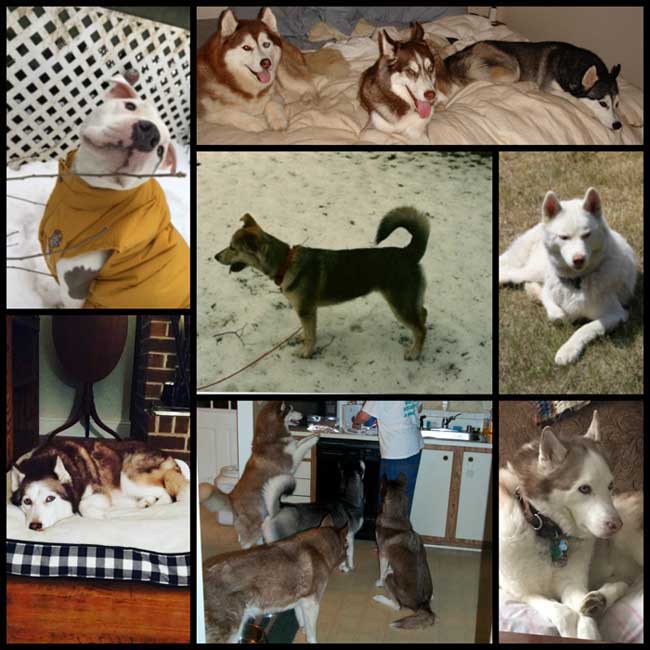When Arctic Spirit Rescue asked me to write about an article about “Special Needs” dogs, a myriad of subjects came to mind. My husband and I are suckers for dogs with disabilities to the point where I started a Website called Gimpy Dogs to help others wade through the confusing and often misleading sites out there selling everything from snake oil to miracle cures and peddling bad information.
We chose to adopt a Siberian Husky with horrible hips, and one with a deformed front paw because we fell in love with them on first sight, but also because we knew that they would need pretty extensive medical care, and had the time, money, and means to give them a wonderful loving home. We also purchased a purebred Siberian Husky from champion lines from a reputable breeder.

Throughout their lives, we’ve dealt with:
- Juvenile Cataracts (and subsequent near blindness)
- Liver tumor
- Perianal adenomas
- Total Hip Replacement
- Knee Surgery
- Compressed disc and spine surgery
- Ehrlichiosis
- Knee surgery
- Chronic Urinary Tract Infections
- Bladder Cancer
- Degenerative Myelopathy
- Bladder Incontinence
If you look at that list, you’ll see that the only thing listed that has anything to do with a dog with bad hips and one with a deformed paw is the Total Hip Replacement. The Husky with the deformed paw has been our least expensive “gimpy dog”. Everything else popped up, out of the blue. Even our purebred, from show lines, reputable breeder raised with perfectly sound parents, and socialized early Siberian Husky needed some “special” care through her life as well. Not to scare you away from bringing a four-legged family member into your home, but Special Needs dogs may pop up out of the blue, you don’t necessarily choose them, and in their senior years, you will most definitely encounter medical issues.
How to Prepare for a Special Needs Dog
Even healthy “normal” dogs will cost you money in the general day-to-day things: food, treats, toys, leashes, crates, collars, and vet bills when they eat their collar, toys, and annual vaccines and check ups. The best way to handle the day-to-day is to be proactive and prepare for the emergencies that may come up.
Pet Insurance vs Savings Account
Some people choose pet insurance, but do your research to find out which type of policy is best for your dog. Some require you to take your dog to specific vets for treatments that are covered. Others require you to pay the vet bill and then get reimbursed for treatment.
We opted to just start a savings account for our dogs and put money in automatically each month. If you can pay a company a monthly fee for insurance, you can put it in a savings account instead. If you start off when they’re puppies and don’t touch it, you generally have enough saved up for some pretty pricey procedures. This way, you don’t pay a company monthly fees, have a stranger determine where your dog is treated, and what gets covered. In the case of companies that reimburse, you still have to come up with the money up front for procedures and hope the procedures are covered under the insurance. Some people save off a special credit card to use for emergencies or needed treatments.
Learn to Filter Information About Your Dog’s Breed
Learn as much as you can about the breed of dog you adopt. All breeds have special issues, training techniques, and congenital issues, so find out from people who know: other people who own the breed, reputable non-profit rescues, and your vet. Learn how to filter out bogus information you may find on the Web, take advice with a grain of salt, and always consult your vet. If you don’t trust your vet to give you good information, then find another vet. If you do trust your vet but think there may be other options out there, don’t hesitate to get a second opinion. If your vet is offended by you wanting a second opinion, then get another vet.
One very important thing to remember: your vet sees your dog once a year, sometimes more. YOU have to be your dog’s advocate and you have to relay important information to your vet on behalf of your dog, so make sure you document things, do some research on a diagnosis, and engage your vet in conversations about the best treatment.
Not So “Special”
Now that I’ve pretty much freaked you out, let me tell you what isn’t so “Special” about Special Needs dogs: They’re just dogs. Sure, you may spend a little more time and sometimes money, caring for them, need a little more patience depending on their disability, but for the most part, they’re just dogs, and they do dog things.
In the case of our huskies, they were typical huskies: stealing whole raw roasts from the counter, shredding toilet paper, escaping, digging, bouncing off the furniture, wooing to go out, in, out, in, out, in, etc.
Dogs have the wonderful capacity of not knowing they are different in any way. Our mutant pawed Loki had no clue he was any different, and ran like the wind. People would say “what’s wrong with his paw?” and we’d freak out and look, thinking something was wrong with his paw, only to realize they were referring to his mutatoe. Sam, with his bad hips, would leap up, nab whole loaves of bread, and gobble them up in seconds. Nova, with almost complete cataract coverage, would still uncannily manage to catch squeeky toys thrown at him, was fine as long as we didn’t move the furniture, still ran up and down the stairs.
Every dog has special needs: they need love, and a good home.
We thank Penny for sharing her experience of living with special needs dogs. We hope her perspective will encourage some potential adopters to consider a dog labeled special needs. Please visit her Gimpy Dogs website for valuable information, insight, links, and support.



